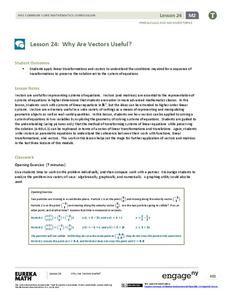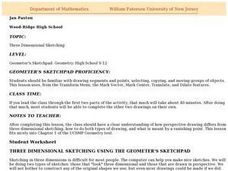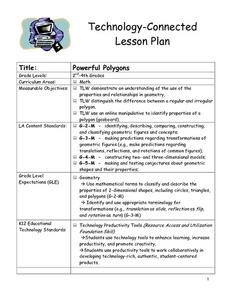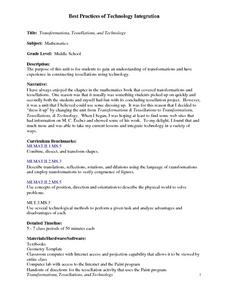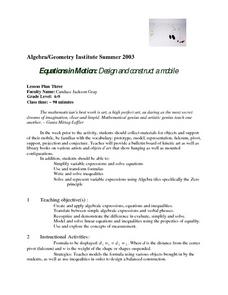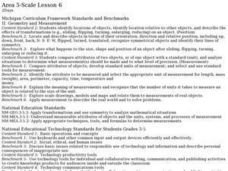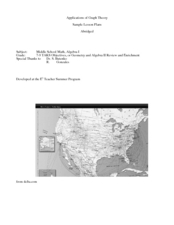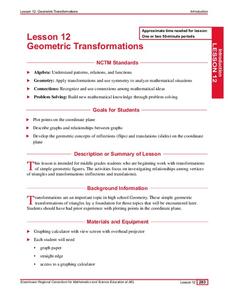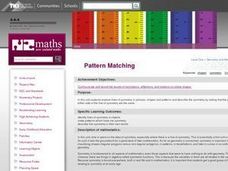EngageNY
Distance and Complex Numbers 2
Classmates apply midpoint concepts by leapfrogging around the complex plane. The 12th lesson plan in a 32 segment unit, asks pupils to apply distances and midpoints in relationship to two complex numbers. The class develops a formula to...
EngageNY
Why Are Vectors Useful? 2
Investigate the application of vector transformations applied to linear systems. Individuals use vectors to transform a linear system translating the solution to the origin. They apply their understanding of vectors, matrices,...
Curated OER
The Tiled Courtyard
Fifth graders use the guess and check technique to solve a problem involving transformations. They work with a grid and criteria provided by the teacher to solve a sequence with black and white rows.
Virginia Department of Education
Rotation
Rotate this resource into your lesson plans. Scholars rotate polygons in the coordinate plane by multiples of 90 degrees. They then compare the original and new figures to develop conjectures about coordinate points after rotations.
PBS
Surface Area and Volume
You and your class will like this lesson on using visual models to relate the volume and surface area of solid shapes. Learners construct three-dimensional forms using nets. They calculate the surface area and volume for each and then...
Curated OER
Transformations
In this transformations instructional activity, pupils draw the transformations of the triangles and parallelograms in graphs. They complete four drawings.
Curated OER
Slides, Flips. Turns......It's All On A Memory Book Page
Fourth graders use tangram sets to investigate the congruence of shapes. They use congruent shapes to demonstrate the properties of slides, flips, and turns. They complete a math journal entry that describes and illustrates each concept.
Curated OER
Design Explorations: Frieze Patterns
Students will explore frieze patterns. A frieze pattern is a mathematical concept to classify designs on two-dimensional surfaces, which are repetitive in one direction, based on the symmetries in the pattern. They will explore examples...
Curated OER
Three Dimensional Sketching
Students become familiar with drawing segments and points. They understand how perspective drawing differs from three dimensional sketching. They demonstrate three dimensional and perspective drawing.
Virginia Department of Education
Dilation
Open up your pupils' eyes and minds on dilations. Scholars perform dilations on a trapezoid on the coordinate plane. They compare the image to the preimage and develop generalizations about dilations.
Curated OER
Powerful Polygons
Students scan the classroom to find different common shapes. They listen as the teacher defines polygon and regular polygon. The teacher demonstrates regular polygons via the Internet and the "Math is Fun" web site. Students go outside...
Texas Instruments
Transformational Puppet
High Schoolers create a puppet and make predictions using the TI Navigator. In this math lesson, they will discuss their results as they explore transformation. This assignment requires the TI navigator or a smartboard.
Curated OER
What do two-dimensional tessellations look like? Where in art can they be found?
Students explore the world of art and culture, including the works of M.C. Escher. They identify and create original tessellations. Students use a wealth of interactive multimedia applications. They explore the artistic representations...
Curated OER
Transformations, Tessellations, and Technology
Students complete a unit about transformations and tessellations. They explore various tessellation websites, determine which shapes tessellate, complete a log about which website activities they complete, and create a tessellation...
Curated OER
Equations in Motion: Design and construct a mobile
Students participate in a lesson that covers the concepts of solving equations and inequalities. To master the concept they must demonstrate visually and verbally how both sides of an equation must be balanced. They construct a balanced...
Curated OER
Scaled Rubber Band Drawings
Learners demonstrate the process of creating a scaled rubber band enlargement of a simple drawing. They observe and discuss a teacher-led demonstration, and create a scaled rubber band enlargement of simple drawings and their invention...
Curated OER
Transformations and Exponential Functions
Tenth graders study graphing exponential functions. For this transformations lesson, 10th graders apply inquiry to determine how changes to a parent function affect its graph. Students analyze transformed graphs and generate the function...
Curated OER
Application of Graph Theory
Students investigate different online tutorials as they study graphing. In this graphing lesson, students apply the concept of graphs cross curricular and use it to make predictions. They define the purpose and theories behind graphs.
Curated OER
Lasting Legacies of Ancient Greece
Ancient Greece lesson plans can open up a world of information for students.
Curated OER
Tessellations
Students identify shapes that will tessellate. They construct a tessellation using transformations. Students identify transformations in tessellations. They identify applications of transformations such as tiling and fabric design.
Curated OER
Slides, Flips and Turns
Third graders slide, turn, and flip their bodies to explain sliding, turning, and flipping geometric shapes.
Curated OER
Geometric Transformations
Students solve problems involving transformations of geometric figures. They review graphing points in the coordinate plain, plot points and connect to create a triangle. Then, they reflect triangles over the x and y axis and use...
Curated OER
Mathematics of Ornaments and Architecture
Students study African traditional architecture. They examine how African ornaments, wall painting and motifs use geometric shapes to express and explain the culture.
They discuss the ornaments and architectural designs in the setting...
Curated OER
Pattern Matching
First graders examine how to determine the lines of symmetry in pictures, shapes, and patterns by completing the lessons in this unit. They make patterns that show a line of symmetry and describe it using their own language.



